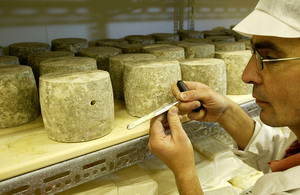Long term economic plan for food and farming announced
Environment Secretary Elizabeth Truss sets out four key areas to help the food and farming industry grow.

Cheese production
A long-term economic plan for food and farming that will ensure this thriving industry continues to grow and create jobs has been revealed by Environment Secretary Elizabeth Truss.
In a speech at the National Farmers Union conference today, the Environment Secretary identified four priorities, including improving the resilience of the industry in the face of volatile global markets, opening up new markets at home and abroad, and simplifying EU regulations to free up food producers to innovate and grow their businesses.
Environment Secretary Elizabeth Truss said:
Britain’s food and farming industry is a powerhouse of our economy – contributing £100 bn each year and employing 1 in 8 people - and has huge potential to deliver further jobs and growth.
Our long-term economic plan for food and farming will unlock the potential of this vital industry – by encouraging more talented entrepreneurs to pursue a career in food, removing unnecessary bureaucracy, protecting the industry from plant and animal diseases, and opening new markets for top quality British food both at home and overseas.
The priorities in the long-term economic plan are:
Enabling a productive and resilient industry
- Encouraging more skilled people into the industry by increasing apprenticeships, working across the food supply chain to improve skills, and with universities to offer new further education opportunities in food – such as the country’s first food engineering degree at Sheffield Hallam
- Enabling the industry to expand and add value to products, such as through the creation of Food Enterprise Zones to kick-start local food economies and join up farming, manufacturing, distribution and retail firms
- Helping farmers and food businesses deal with global market volatility, such as exploring the feasibility of a futures market for dairy products
- Slashing red tape – Defra is on course to cut guidance by 80% over the course of this parliament, and 34,000 farm inspections have been cut by combining visits and expanding schemes to reward exemplary farms with less frequent checks
Opening up new markets at home and abroad
- Encouraging more top-quality regional foods to apply for Protected Food Name status. The UK currently has 62 but has a long way to go to match the 219 protected foods in France
- Buying more high quality British food in schools, hospitals and public sector canteens – creating up to £400 million in new business for local businesses
- Pushing the EU Commission to make country of origin labelling mandatory for dairy products
- Opening up new export markets – the government has opened more than 600 new markets – and focussing on the most lucrative opportunities such as trade with China and the US
- Opening markets in the economies of the future – such as dairy markets in Latin America and sub-Saharan Africa
Making EU rules work for us
- We have told the EU Commission that decisions on pesticides must be proportionate and based on science to avoid holding back competitiveness of our arable farmers
- Encouraging Europe to embrace scientific advances such as GM – the EU recently agreed to permit greater national discretion on GM products
- Working with the Agriculture Commissioner Phil Hogan to simplify the Common Agricultural Policy. A list of practical proposals developed with the farming industry are being presented to the commission
- Making it as simple as possible for farmers to claim their CAP payments through the Rural Payments digital service
Protecting this country from plant and animal disease
- Upholding our world-class system for protecting the country against animal disease. The number of frontline vets to protect farm businesses from animal diseases has been maintained
- Tackling bovine TB through our comprehensive strategy which aims to eradicate the disease by 2038